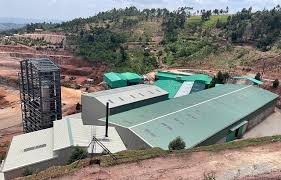Uganda has started a major project to improve its coffee industry and increase earnings from processed coffee products. The project, called the Africa Coffee Park, is being developed in Ntungamo District and is expected to boost Uganda’s position as a leader in value-added coffee exports under the African Continental Free Trade Area (AfCFTA). The project is being led by Inspire Africa Group in partnership with the Ugandan government and is part of the country’s long-term plan to get more value from its agricultural exports.
The Africa Coffee Park is not just about coffee processing. It will serve as a large facility where coffee beans will be transformed into various finished goods like instant coffee, ready-to-drink coffee beverages, energy drinks, and even cosmetics. The park is also expected to include a business hub, a coffee academy, a sports complex, a convention centre, an exhibition centre, and a technology park. These additional features aim to promote innovation and industrial growth within the coffee value chain and beyond.
Nelson Tugume, the Chief Executive Officer of Inspire Africa Group, said the aim is to raise Uganda’s coffee earnings from the current $1.2 billion to about $5 billion in the next five years. Tugume stated that this dream is possible through proper value addition, local processing of coffee beans, and increased exports of finished coffee products rather than raw beans. As of September 2024, about 163 people had already been employed by the Africa Coffee Park project, and more jobs are expected to be created as the facility becomes fully operational by May 2025.
President Yoweri Museveni has shown strong support for the coffee park, describing it as an important move to ensure Uganda earns more from its natural resources. He pointed out that when Uganda exports unprocessed coffee beans, the country earns far less compared to exporting processed or packaged coffee. According to him, the new project will help retain more of the value from coffee within the country and will also reduce dependency on foreign companies that process African raw materials abroad.
The Africa Coffee Park is part of Uganda’s Fourth National Development Plan (NDPIV), which focuses on increasing production and improving productivity in key sectors like agriculture, tourism, information technology, and finance. The government believes that through improved coffee processing and increased value addition, household incomes will grow, and more people in rural communities will benefit directly from the country’s coffee wealth.
This development is also coming at a time when the AfCFTA is opening new opportunities for African countries to trade with each other without heavy restrictions. Uganda hopes to take advantage of this trade agreement by selling value-added coffee products to neighbouring African markets and reducing reliance on traditional export destinations like Europe and North America.
Aside from the Africa Coffee Park in Ntungamo, other coffee industrial projects are being developed in different parts of Uganda, including the Luwero Coffee Park. These projects are designed to support the larger goal of making Uganda a major centre for coffee processing and marketing on the continent. According to industry analysts, the country is moving in the right direction by shifting focus from exporting raw materials to producing finished goods that have higher market value.
Experts say the Africa Coffee Park will not only help Uganda earn more foreign exchange but will also create jobs, boost industrialisation, and support young entrepreneurs and farmers. It is expected to encourage more private investment in agro-processing and open up opportunities for research and development within the coffee sector.
As the full launch date draws closer, the Ugandan government and Inspire Africa Group have promised to continue working together to ensure the success of the project. By May 2025, Uganda hopes to see the Africa Coffee Park operating at full capacity and helping the country move closer to its target of becoming Africa’s number one producer and exporter of value-added coffee products.
